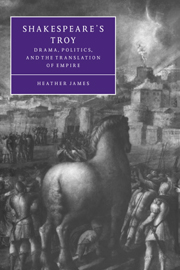Book contents
- Frontmatter
- Contents
- List of illustrations
- Acknowledgements
- Introduction: Shakespeare's fatal Cleopatra
- 1 Shakespeare and the Troy Legend
- 2 Blazoning injustices: mutilating Titus Andronicus, Vergil, and Rome
- 3 “Tricks we play on the dead”: making history in Troilus and Cressida
- 4 To earn a place in the story: resisting the Aeneid in Antony and Cleopatra
- 5 Cymbeline's mingle-mangle: Britain's Roman histories
- 6 “How came that widow in?”: allusion, politics, and the theater in The Tempest
- Notes
- Index
- Cambridge Studies in Renaissance Literature and Culture
Introduction: Shakespeare's fatal Cleopatra
Published online by Cambridge University Press: 29 October 2009
- Frontmatter
- Contents
- List of illustrations
- Acknowledgements
- Introduction: Shakespeare's fatal Cleopatra
- 1 Shakespeare and the Troy Legend
- 2 Blazoning injustices: mutilating Titus Andronicus, Vergil, and Rome
- 3 “Tricks we play on the dead”: making history in Troilus and Cressida
- 4 To earn a place in the story: resisting the Aeneid in Antony and Cleopatra
- 5 Cymbeline's mingle-mangle: Britain's Roman histories
- 6 “How came that widow in?”: allusion, politics, and the theater in The Tempest
- Notes
- Index
- Cambridge Studies in Renaissance Literature and Culture
Summary
This study investigates Shakespeare's use of the political and literary tradition derived from imperial Rome to legitimate the cultural place of the theater in late Elizabethan and early Stuart London. It began in efforts to understand why a playwright unpretentious about his learning should introduce explicit textuality and even books at moments of crisis in plays that seek to shape English cultural identity in relation to imperial Rome. Although the citational force of the following scenes remains to be seen, I refer to the entrance of Lavinia, previously a Vergilian figure, “her hands cut off and her tongue cut out, and ravished” according to Ovidian and Petrarchan conventions; Achilles' crisis of exemplarity, in which he is reduced to his constituent histories or redactions; Antony's manful attempt to resist Vergil's derisive portrait of his choices; Imogen's disturbing laments over what she takes to be Posthumus' headless body, an image that crosses the pietà with the fallen body of Priam in Aeneid 2; and finally, Prospero's use of the incantations of Ovid's Medea to renounce his rough and Vergilian magic and to drown his book.
The strikingly visual or emblematic character of these scenes is tied to a complex textuality unusual for the popular theater. Disentangling such knots led to an investigation of the generic character and historical occasions of a group of Shakespeare's plays I call “translations of empire,” after the literary-political tradition dedicated to the transfer of authority from Troy to imperial Rome to London (Troynovant) and, although this aspect of its traffic is less often noted, from one social sphere to another within London.
- Type
- Chapter
- Information
- Shakespeare's TroyDrama, Politics, and the Translation of Empire, pp. 1 - 6Publisher: Cambridge University PressPrint publication year: 1997

